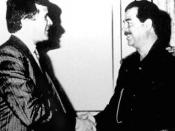Introduction Since the end of the Cold War, the United States' role as international peacekeeper was under fire from the public. If the threat of Communism was no longer a major concern, why should the United States continue to intervene overseas? During the Cold War the United States intervened in numerous wars to prevent a communist country, or a communist-friendly country from overtaking a democratic country. Without this threat, the United States' justification for intervention has become a case by case situation. This paper will study the Persian Gulf conflict, and provide several reasons for intervening.
First, and foremost, the issue of oil in the Middle East was a paramount reason for intervention. It was the goal of the United States to ensure that oil would continue to be offered to the Western world at reasonable prices. Secondly, the United States had a vested interest in protecting their perennial ally, Israel.
The United States, for several reasons, has always been the protector of Israel, and continued to play that role in intervening in the Middle East. Morality also played a role in why the United States decide to become involved in the Persian Gulf Crisis. Whether it was simply a strategic public policy move, or that the decision-makers truly believed it was such an atrocious act by Iraq that they were compelled to become involved, the moral ramifications of the Iraqi invasion were part of the reason the United States became involved.
The second part of this paper will review three theorists' beliefs on intervention. Thomas Paine's Rights of Man contained several assertions about cosmopolitanism, and the role of interventions. Immanual Kant also discussed his theories on intervention in his essay, Perpetual Peace. Lastly, Hans J. Morgenthau covered what he believed to be legitimate reasons for intervention in his...


